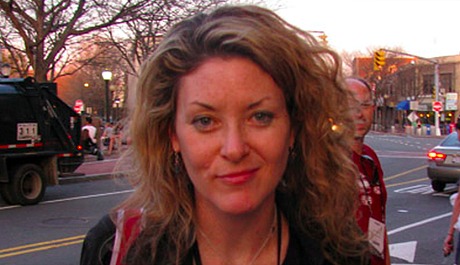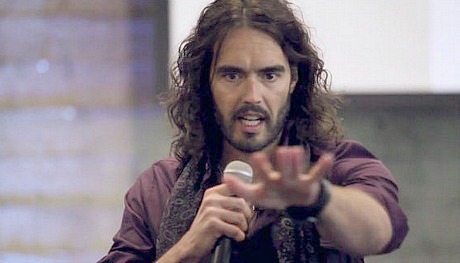Last Tuesday I spoke with Ondi Timoner, director of Brand: A Second Coming, a fascinating, motor-mouthed portrait of actor-comedian-social activist Russell Brand. It will open Austin’s South by Southwest film festival this evening. Timoner’s doc (partly shot by HE’s own Svetlana Cvetko) is one of the most unusual and impressive documentary portraits of a famous person I’ve ever seen because of…well, its eagerness to step out of the standard function of a documentary and take the proverbial ride. It’s a film that transcends itself and becomes something else by embracing the attitude and temperament of its subject. Just as Brand has begun moving the focus of his life beyond fame and wealth and the lowest form of humor (i.e., simply making people laugh), Brand: A Second Coming is about seeing and transcending and turning a page. It’s about breaking out of the Wachowski’s Matrix by way of comic irreverence, manic energy and a massive ego.

Ondi Timoner, director of Brand: A Second Coming.

Russell Brand
Brand is partly advocating a kind of Iceland-styled social revolution by way of consciousness raising and neighborhood organizing and more compassion for drug addicts and fierce resistance to most of the goals and systems of 1% corporate dominance, and partly calling for the debunking of conservative myths about individual fulfillment through the acquisition of power, money, sex, property, etc. Brand is rich so who’s he to talk, right? His response is to swear over and over that he’s been to the very top and gotten drunk on luxury and debauch and that none of the spoils are particularly fulfilling. He genuinely sees himself as a kind of change agent in the vague tradition of Malcolm X, Jesus of Nazareth, Mahatma Gandhi and Che Guevara. I realize this will rub some the wrong way, but what’s wrong with choosing these fellows as heroes and wanting to follow in their path? Brand’s obviously an eccentric, but he has the aura of a guy who’s really seen through the bullshit.
Born in June 1975, Brand first gained fame as a nervy, drug-addicted stand-up comedian, award-show m.c. and televized provocateur. He became sober in ’04 and got into transcendental meditation but continued to provoke and challenge and piss people off. His first big American-fame injection came, of course, from starring roles in Forgetting Sarah Marshall, Get Him To The Greek and Arthur. But gradually the focus of his comedy became more and more political, and Timoner’s film comes alive when this phase, which kicked in sometime around 2012, takes over. We’re speaking of a phase in which Brand has more or less forsaken narcissism in and of itself (well, mostly) and has resolved to be, as he explained during a relatively recent q & a, “the people’s narcissist.”
Timoner didn’t begin to make the film that Brand: A Second Coming gradually became, or a film about transformation. She was hired a couple of years ago to try and fix a doc about happiness (which was literally called Happiness) that Brand had been working on. The doc wasn’t uninteresting, Timoner felt, but it wasn’t good enough. It was basically about Brand interviewing Mike Tyson, David Lynch, Oliver Stone, 50 Cent, Cameron Diaz, et. al. But there was very little of Brand himself. When Timoner showed up for a meeting to offer notes, she was surprised to find Brand in attendance, and soon after realized that his attitude and personality were what the film needed. She sold him on this and wrangled creative control.
Brand: A Second Coming runs about 115 minutes, give or take. The first 40 minutes are about the hyper, nervy, occasionally drugged-up provocateur and his many episodes of offense and outrage as he performed, shagged scores of women, made films, etc. (The story, in other words, recounted in Brand’s “My Booky Wook.”) The last 75 minutes are about the sober, meditating, socially engaged guy that he gradually grew into — the guy who wrote and performed Messiah Complex, who created The Trews (i.e., Brand’s YouTube channel), who wrote “Revolution.”
I understand the structural necessity of the doc covering the first 40 minutes (you have to start at the beginning of any tale and tell it as honestly, thoroughly and economically as possible) but I loved the last 75.
Timoner began shooting with Brand during the summer of 2013, and even then “I really don’t think he had any of this transitional stuff on my mind,” she says. “He hadn’t created the Trews…hadn’t written the Messiah Complex tour…hadn’t written ‘Revolution’ It wasn’t orchestrated. Sometimes these films are bigger than we are. I hope people will consider Russell’s journey as it relates to their own…the virtues of breaking the rules, stepping out of line.”
Brand was not entirely pleased with the process of being filmed and invaded, and tried to set limits. They tested each other, poked at the boundaries. Brand called Timoner his “ginger ninja shadow” at one point. Theirs was a difficult push-pull relationship but they gradually found a sort of rapprochement. Brand was impressed but unhappy when he saw the final cut; he felt it was too revealing or invasive and asked for extra material to be shot and inserted. Timoner’s creative control was contractual but she obliged nonetheless.
Timoner reminded me to pay attention to her YouTube interview channel, called “Bring Your Own Documentary with Ondi Timoner.” Dozens of interviews with name-brand documentarians.
Again, the mp3.
